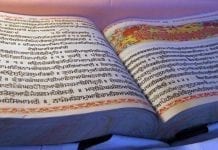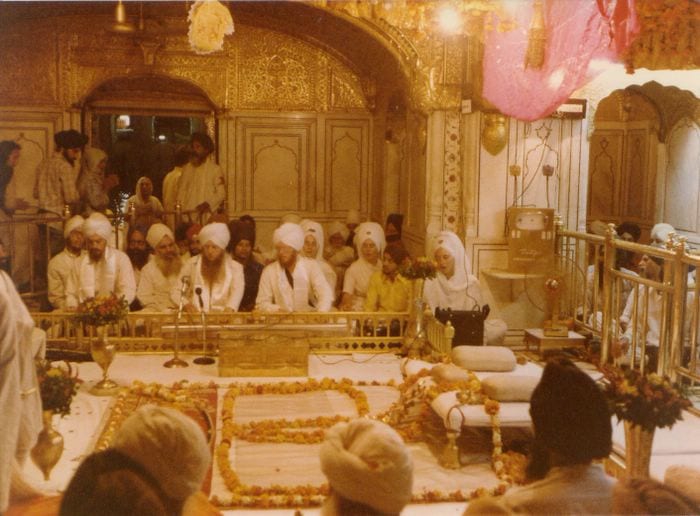ਕੀਰਤਨੁ (keertan)
Meaning: noun: Praises, singing praises of the Divine, usually with musical instruments.
Quote:
ਕਲਜੁਗ ਮਹਿ ਕੀਰਤਨੁ ਪਰਧਾਨਾ॥
kaljug mahi keertan pardhaanaa.
In the modern era, singing praises of the Divine is the highest (religious practice). – Guru Arjan Sahib, Guru Granth Sahib, 1075
Message: If simran or meditation (i.e. keeping the Divine in one’s mind or remembering Him at all times) represents one of the core or central philosophies of Sikh faith, then singing and music is the keystone of the practice of Sikh spirituality. Guru Nanak set the tone of “practical” Sikhi by using music and melody as his way of speaking with the Divine. Melodic form (raag) and rhythmic beats (taal) made up the backbone of his spiritual communication. And this was no ordinary music either; Guru Nanak had created a type of divine music that had the potential to stir the soul, i.e. bring out the emotions, passions, and sentiments that can be felt within the core of our being.
The nature of this music is that it consists of lyrics and poetic composition of the divine discourse (Gurbani). Music conveys a feeling to the heart, whereas poetry (the written form of Gurbani) conveys a message to the mind. The Gurus knew that this combination of music and poetry would act as a spiritual catalyst by allowing one to simultaneously understand (with the mind) and feel (with the heart) the inherent messages of hymns.
It follows that the Gurus would prescribe the hymns to be sung in proper raag and taal to put the devotee in contemplative mood; this raag taal classical style of singing is conducive for both contemplation and understanding (because it requires the lengthened articulation of each word, which allows for the mind to focus on the words in Gurbani), and at the same time invoke a complementary feeling. Singing hymns using this framework—as opposed to experimental music with catchy tunes—has the greatest potential to feel, understand, appreciate, and experience the message inherent in Gurbani and to connect them in the deepest possible sense.
Poetry is the music of the soul, and, above all, of great and feeling souls. – Voltaire
Click here to listen to full hymn: https://www.youtube.com/watch?v=wUESnU_egJg
Etymology: From Sanskrit keertan (telling; praise; eulogy) → Pali kittan (praise) → Prakrit kittaṇ (praise, recitation) → Nepali kitan (singing).




